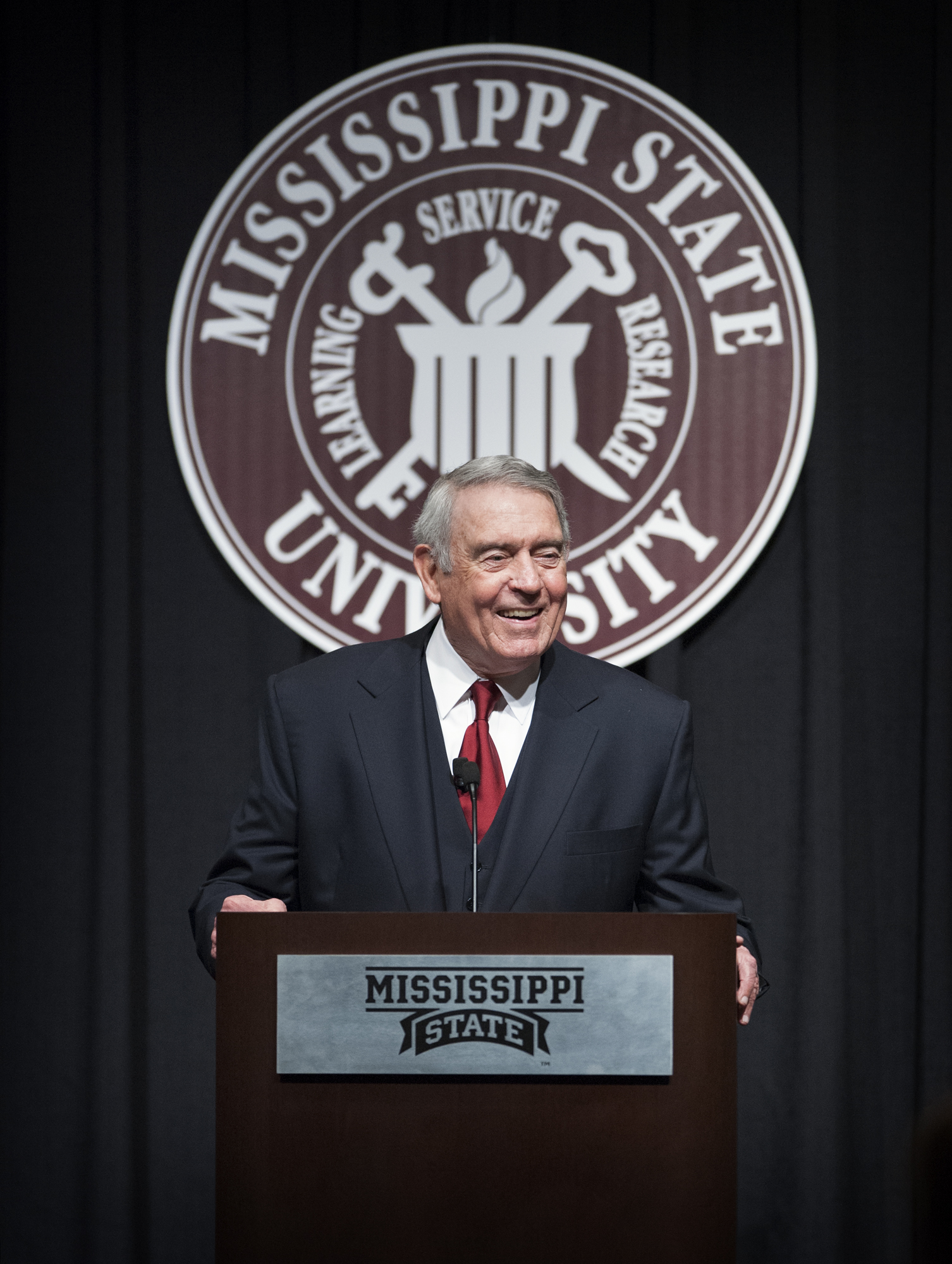Contact: Allison Matthews

Photo by: Megan Bean
Dan Rather related stories of some of the world's most influential leaders and shared his experiences as a reporter who landed his dream job during his talk at Mississippi State Tuesday [Feb. 18] evening.
The longtime CBS Evening News anchor was a special guest of the university's Student Association as part of the SA's ongoing Global Lecture Series. Also an award-winning correspondent for CBS's long-running 60 Minutes news magazine, Rather now is managing editor and anchor of Dan Rather Reports, a news magazine on cable channel AXS TV.
Rather drew from his coverage of historical leaders who left a legacy in American and world history, including John F. Kennedy, Martin Luther King Jr., Mother Teresa, Lyndon Johnson and Nelson Mandela.
While he doesn't consider himself a leader or an expert on leadership, Rather said he got a first-hand view of leaders who made profound impacts on the world throughout his journalism career.
Rather said he learned early that in addition to having vision, leaders must be persistent and passionate and be able to establish communicable trust. He said authenticity is also an essential element for leadership.
"Not every leader has each one of these things, but they're the common threads running through leadership," Rather said. "Leaders, the best of them are trustworthy, loyal and kind," he added.
Rather said covering Martin Luther King Jr. during the civil rights movement, "changed me both as a person and as a pro." He said King demonstrated another important characteristic of leaders -- courage.
He said that like King, Mahatma Gandhi and Nelson Mandela were leaders who had a tremendous passion for their goals and pursued them with unbelievable courage.
Rather said Mandela's life illustrated an important element of strong leadership in the fact that he was open to change, including changing his own mind after initially embracing violence as the best means of asserting social change. Over time, Rather said, in part by studying Gandhi and King, Mandela came to endorse passive nonviolent means of affecting social change.
Rather reflected on being in Dallas when President Kennedy was assassinated and discussed covering the administrations of subsequent chief executives in the White House. He said one of the most overlooked powers of the presidency is the power of persuasion.
He said Kennedy, the first president to be born in the 20th century, was also the first to truly understand how television could be used as a powerful communication tool used to persuade people.
Rather said he believes history will not overlook the significance of President Johnson's role in the passage of the Civil Rights Act of 1964 which did away with institutionalized racism. But he contrasted Johnson's leadership style with his predecessor, saying Johnson was much more comfortable influencing people during personal communication. He said the 36th president was a scholar of other leaders and carefully studied people to understand which of their strengths and weaknesses could be leveraged to successfully persuade them.
Rather also reflected on Mother Teresa, who with a quiet voice showed great leadership and profoundly impacted those she encountered.
"She was a leader, and a leader for good," Rather said, adding that she was very effective in securing needed funds and support for her areas of ministry.
Rather said leaders have a vision for something bigger than oneself, but he advised the audience to avoid a classic mistake, one which he admitted to making himself at times during his career.
"I made the mistake, the classic mistake, of some of the leaders. I got the big head. I began to think it was about me," he said. Fortunately, Rather said his wife Jean helped him overcome his error.
Rather said a leader needs to have good trustworthy people around.
"A leader needs to have people around... who will tell you what you don't want to hear, but what you need to hear," Rather said. He added that leaders in turn must be good listeners.
Rather said as Americans, each person has a duty to be a leader as a citizen.
"Our duty as a citizen is essential and noble work," he said.
Rather also signed copies of "Rather Outspoken: My Life with the News," his 2012 memoir.
For more information about Mississippi State University, see www.msstate.edu.